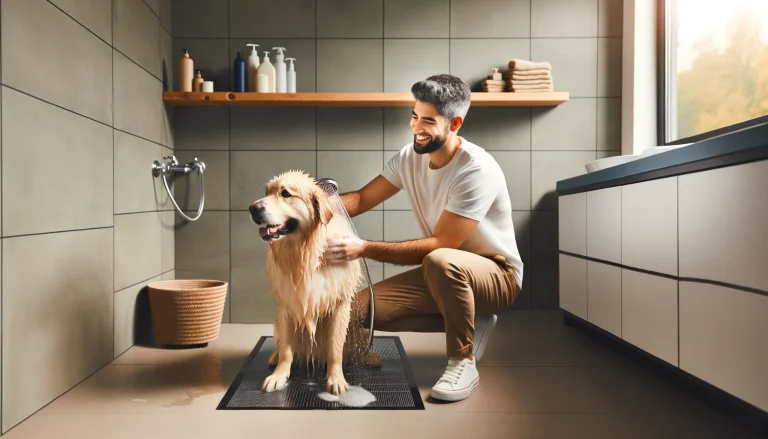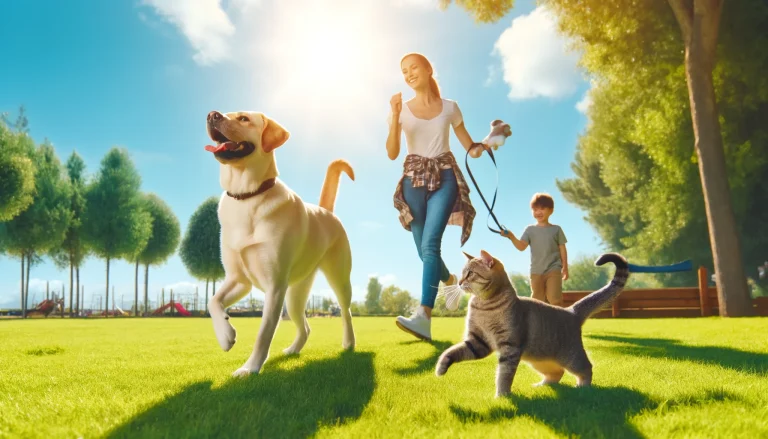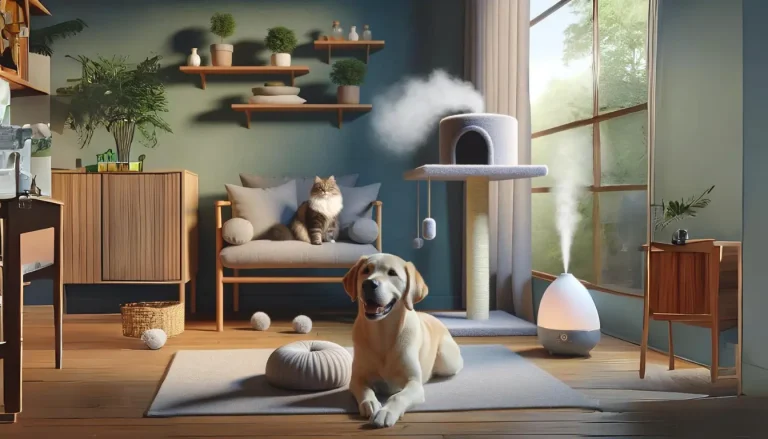The Importance of Socialization
Bringing a pet into your home is a joyous occasion, but ensuring that they grow up to be sociable and friendly requires dedicated effort. Developing a sociable pet is a crucial aspect of pet ownership, shaping how your pet interacts with other animals, humans, and new environments. A well-socialized pet is not only happier but also more confident and well-behaved, making life easier and more enjoyable for both of you.
Socialization is about more than just exposing your pet to different stimuli; it’s about teaching them how to respond appropriately to new experiences. This process helps to prevent behavior problems, reduce anxiety, and ensure your pet can navigate the world around them with ease. Whether you have a puppy, kitten, or an adult pet, taking steps to foster their social skills will have long-lasting benefits.
In this blog, we’ll delve into the key aspects of developing a sociable and friendly pet. From understanding the stages of socialization to implementing effective training techniques, we’ll provide you with the knowledge and tools you need to help your pet thrive. So, let’s explore how you can create a positive, enriching environment that promotes friendly behavior and confidence in your furry friend.
Understanding Pet Socialization
Definition of Pet Socialization
Pet socialization is the process of exposing your pet to a variety of environments, people, animals, and experiences to help them develop into well-adjusted and confident individuals. This exposure teaches pets how to react to different situations calmly and appropriately. Effective socialization helps prevent fear and aggression, fostering a friendly demeanor and good behavior.
Socialization isn’t just about making your pet friendly; it’s about providing them with the skills to handle new experiences without anxiety. This includes introducing them to different sounds, sights, smells, and interactions in a controlled and positive manner. A well-socialized pet is adaptable and resilient, making them a joy to be around and easier to manage in various situations.
Key Stages in a Pet’s Life for Effective Socialization
- Puppy and Kitten Socialization (3-14 Weeks): The first few weeks of a puppy’s or kitten’s life are critical for socialization. During this period, they are most receptive to new experiences. Introducing them to a wide range of stimuli in a positive way can help them grow into confident and well-behaved adults. This stage is ideal for exposing them to different people, other animals, various environments, and common household noises.
- Juvenile Stage (14 Weeks to 6 Months): As pets grow, their curiosity continues, but they may also start to develop fear responses. Continued socialization during this stage helps reinforce positive behaviors and ensures they remain comfortable with new experiences. Regular interaction with other pets, people, and environments is essential to maintain their social skills.
- Adolescence (6 Months to 1-2 Years): This stage can be challenging as pets may test boundaries and display more independence. Consistent socialization and training are crucial during adolescence to reinforce good behavior and address any emerging issues. Positive reinforcement and ongoing exposure to various stimuli help solidify their social skills.
- Adulthood (1-2 Years and Beyond): While early socialization lays the foundation, ongoing exposure to new experiences throughout a pet’s life is important. Adult pets can still learn and adapt, though the process may take longer. Continued social interaction, training, and positive reinforcement help maintain a friendly and sociable demeanor.
By understanding these key stages and the importance of early and continuous socialization, you can focus on developing a sociable pet that navigates the world with confidence and ease. The effort you put into socializing your pet will pay off in a well-adjusted, happy, and friendly companion.
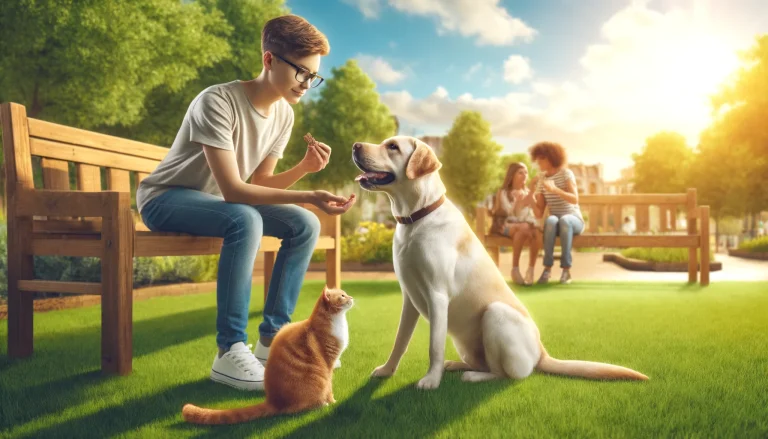
Early Socialization: The Foundation of Friendliness
Importance of Early Socialization
The early stages of a pet’s life are crucial for their development. Just as young children need to learn social skills, so do puppies and kittens. Early socialization lays the foundation for a pet’s behavior and interactions throughout their life. During this formative period, pets are most receptive to new experiences, making it the ideal time to introduce them to various stimuli.
Early socialization is crucial for developing a sociable pet and helps prevent behavioral problems such as fearfulness, aggression, and anxiety. It ensures that your pet grows up to be well-adjusted and comfortable in different environments and situations. By exposing them to diverse experiences early on, you help them develop the confidence and social skills they need to thrive as adults. Well-socialized pets are generally happier, less stressed, and more enjoyable to be around.
Techniques for Socializing Puppies and Kittens
- Gradual Exposure: Introduce your puppy or kitten to new experiences gradually. Start with quiet and controlled environments before moving on to busier, more chaotic settings. This helps them build confidence without becoming overwhelmed.
- Positive Reinforcement: Use treats, praise, and affection to reward your pet when they encounter new experiences calmly and confidently. Positive reinforcement helps create positive associations with new stimuli, encouraging friendly behavior.
- Interaction with Different People: Allow your pet to meet a variety of people, including children, adults, and seniors. Ensure these interactions are gentle and positive. This helps your pet become comfortable around different types of people.
- Exposure to Other Animals: Arrange playdates with other vaccinated and well-behaved pets. This can help your pet learn appropriate play behavior and communication skills. Supervised interactions with other animals are crucial for developing social skills.
- Variety of Environments: Take your pet to different places, such as parks, pet-friendly stores, and friends’ houses. Exposure to different environments helps them become adaptable and less likely to be fearful in new situations.
- Handling and Grooming: Get your pet used to being handled and groomed early on. Touch their paws, ears, and mouth gently to get them accustomed to human touch. Regular grooming sessions can make future vet visits and grooming appointments less stressful.
- Introduce Sounds and Objects: Expose your pet to various sounds, such as doorbells, vacuum cleaners, and traffic noises. Introduce them to different objects like umbrellas, hats, and household items. This reduces the likelihood of them becoming fearful of these sounds and objects later in life.
- Training Classes: Enroll your puppy or kitten in socialization or training classes. These classes provide structured socialization opportunities and teach basic obedience skills in a controlled environment.
Use these techniques during the early stages of your pet’s life, you can help them develop into sociable, friendly, and confident adults. Early socialization is the key to preventing behavioral problems and ensuring a positive, fulfilling relationship with your pet.
Challenges of Socializing Adult Pets
Socializing adult pets can be more challenging than socializing puppies and kittens, as adult animals may already have ingrained behaviors and experiences that influence their reactions. Adult pets might exhibit fear, anxiety, or aggression when faced with new situations, making the socialization process slower and more complex. Additionally, adult pets may have had limited exposure to different environments and stimuli, which can heighten their stress and discomfort in new situations.
Tips and Strategies for Effective Socialization of Adult Dogs and Cats
- Patience and Consistency: Socializing an adult pet requires patience and consistent effort. Gradually introduce them to new experiences at a pace they are comfortable with. Avoid rushing the process, as this can exacerbate fear and anxiety.
- Positive Reinforcement: Use treats, praise, and affection to reward your pet for calm and positive behavior during socialization. Positive reinforcement helps create positive associations with new experiences.
- Controlled Environments: Start socialization in controlled, low-stress environments before gradually introducing your pet to more stimulating settings. This helps build their confidence and reduces anxiety.
- Professional Help: Consider seeking assistance from a professional trainer or behaviorist, especially if your pet shows signs of extreme fear or aggression. Professionals can provide tailored strategies to address specific behavioral challenges.
- Slow Introductions: When introducing your pet to new people or animals, do so slowly and carefully. Allow your pet to approach at their own pace and provide plenty of positive reinforcement for calm behavior.
With these strategies, you can help your adult pet develop the social skills necessary for a happier, more confident life.
Training Techniques for Friendly Behavior
Positive Reinforcement Training Methods
Positive reinforcement is one of the most effective training methods for encouraging friendly behavior in pets. This technique involves rewarding your pet with treats, praise, or playtime whenever they exhibit desirable behavior. By consistently rewarding good behavior, you reinforce those actions, making them more likely to be repeated. Here are some key aspects of positive reinforcement training:
- Consistency: Always reward your pet immediately after they perform the desired behavior. This helps them make the connection between the action and the reward.
- Patience: Training takes time, so be patient and persistent. Consistent practice will yield better results over time.
- Variety of Rewards: Use a mix of treats, verbal praise, and physical affection to keep your pet motivated and engaged.
Commands and Behaviors to Encourage Friendliness
Teaching your pet specific commands and behaviors can significantly enhance their social skills and friendliness. Here are some essential commands and behaviors to focus on:
- Sit and Stay: Teaching your pet to sit and stay on command helps manage their excitement during interactions. This is particularly useful when meeting new people or other pets, as it encourages calm behavior.
- Come: A reliable recall command is crucial for ensuring your pet returns to you promptly, especially in social settings. This command can prevent potential conflicts and keep your pet safe.
- Gentle: Teaching your pet to be gentle with their mouth and paws can prevent accidental bites or scratches. This is particularly important for interactions with children or elderly individuals.
- Leave It: The “leave it” command helps your pet ignore distractions and avoid potentially harmful situations. This command is useful in social environments where there may be unfamiliar objects or other animals.
- Greeting Manners: Train your pet to greet people and other pets politely. This can include sitting calmly when approached and refraining from jumping up on people. Reward your pet for calm, friendly behavior during greetings.
Socialization Games and Activities
Incorporate socialization games and activities into your training routine to make learning fun and engaging for your pet. Activities such as playing fetch in a dog park, participating in obedience classes, or arranging playdates with other pets can provide valuable socialization opportunities.
The positive reinforcement and focus on specific commands and behaviors are essential for developing a sociable pet. Consistent training and practice will lead to a well-behaved, confident, and friendly pet that is a joy to be around.
Interactions with Other Pets
Encouraging positive interactions between your pet and other animals is a crucial aspect of socialization. Whether you have a dog, cat, or another type of pet, learning to interact appropriately with fellow animals can significantly enhance their social skills and overall happiness.
Supervised Playdates and Interactions
Organizing supervised playdates is an excellent way to help your pet develop social skills. Here are some tips to ensure successful interactions:
- Choose the Right Playmates: Select animals with compatible temperaments and energy levels. For example, a calm, older dog may not be the best match for a highly energetic puppy.
- Neutral Territory: Arrange playdates in neutral locations, such as parks or friend’s houses, to prevent territorial behavior. This helps pets feel more relaxed and open to socializing.
- Monitor Behavior: Keep a close eye on interactions to ensure they remain positive. Look for signs of stress or aggression, such as growling, hissing, or stiff body language, and intervene if necessary.
- Short Sessions: Start with short play sessions to prevent overstimulation. Gradually increase the duration as your pet becomes more comfortable with social interactions.
Recognizing and Encouraging Positive Behavior
Positive reinforcement plays a vital role in teaching your pet how to interact with others. Here’s how you can recognize and encourage good behavior during playdates:
- Reward Calm Behavior: Praise and reward your pet for calm and friendly interactions. This can include sniffing, gentle play, and relaxed body language.
- Discourage Rough Play: If play becomes too rough, gently separate the animals and give them a moment to calm down. Reward them once they exhibit calmer behavior.
- Use Verbal Cues: Teach your pet verbal cues such as “gentle” or “easy” to guide their interactions. Reward them for responding appropriately to these cues.
- Provide Breaks: Allow for breaks during play sessions to prevent exhaustion and overstimulation. This helps maintain a positive experience for both pets.
Building Confidence in Interactions
For pets that are initially shy or fearful, gradual exposure to other animals can help build confidence. Here are some strategies to consider:
- Controlled Introductions: Start with brief, controlled introductions to other pets. Use leashes or barriers if necessary to provide a sense of security.
- Positive Associations: Use treats and praise to create positive associations with other animals. Gradually reduce the distance between pets as they become more comfortable.
- Patience and Persistence: Building social skills takes time, especially for adult pets. Be patient and consistent with your efforts to help your pet develop confidence and friendliness.
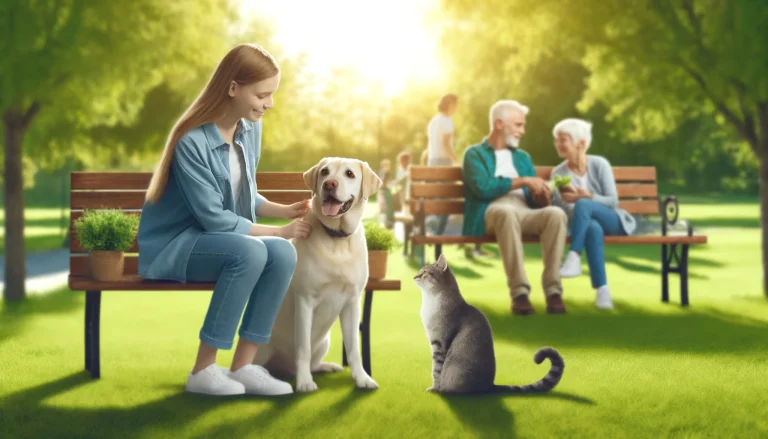
Interactions with Humans
Developing a sociable pet by socializing them with humans is essential for their development into a friendly and well-adjusted companion. Pets that are comfortable around people are more likely to be calm, confident, and well-behaved in various social situations. Here’s how to effectively socialize your pet with humans:
Socializing Pets with Different Types of People
Introducing your pet to a diverse range of people helps them become more adaptable and reduces the likelihood of fear or aggression toward strangers. Here are some steps to follow:
- Variety of Ages and Appearances: Expose your pet to people of different ages, genders, sizes, and ethnicities. This helps them get used to the various ways people might look and behave.
- Gentle and Calm Introductions: Ensure initial interactions are gentle and calm. Allow your pet to approach new people at their own pace. Encourage visitors to kneel down to the pet’s level and offer a hand for sniffing.
- Positive Experiences: Associate human interactions with positive experiences. Have visitors give your pet treats or engage in gentle play. This creates a positive association with meeting new people.
Teaching Pets to Be Gentle and Well-Mannered Around Humans
To ensure your pet behaves appropriately around humans, focus on teaching them good manners and gentle behavior:
- No Jumping: Train your pet not to jump on people. Encourage them to sit calmly when greeting someone. Use commands like “sit” and “stay,” and reward them for complying.
- Gentle Play: Teach your pet to play gently. Avoid roughhousing or allowing them to use their teeth on human skin. Use toys to redirect any nipping or biting behavior.
- Respect Personal Space: Help your pet understand boundaries by teaching them to respect personal space. Reward them for maintaining a polite distance and not crowding or pawing at people.
- Calm Demeanor: Encourage a calm demeanor by rewarding relaxed behavior. If your pet becomes overly excited, ask them to sit or lie down until they calm down. Consistent practice helps them learn to stay calm in social situations.
Socialization Activities
Incorporate activities that encourage positive human interactions:
- Visits to Pet-Friendly Places: Take your pet to pet-friendly stores, parks, and cafes where they can meet new people in a controlled environment.
- Invite Friends Over: Regularly invite friends and family over to interact with your pet. Ensure these visits are positive and stress-free for your pet.
- Obedience Classes: Enroll in obedience classes where your pet can interact with both the trainer and other participants. This structured environment is ideal for reinforcing good behavior.
Handling Unfamiliar Situations
Teach your pet to handle unfamiliar situations with confidence:
- Desensitization: Gradually expose your pet to new experiences, such as loud noises, crowded places, or people in uniforms. Use treats and praise to reassure them.
- Calm Reactions: Stay calm and composed during new experiences. Your pet will take cues from your behavior, so maintaining a relaxed demeanor helps them stay calm too.
Maintaining Socialization
Maintaining socialization is crucial for developing a sociable pet and keeping them friendly throughout their life. Consistently engage in ongoing socialization practices such as regular playdates, visits to pet-friendly places, and interaction with different people and animals. Continuously expose your pet to new experiences, environments, and stimuli to prevent them from becoming fearful or anxious. Reinforce positive behavior with treats and praise, and ensure they remain well-mannered and calm in various situations. Regularly updating training and reinforcing social skills will help your pet stay confident, adaptable, and happy, fostering a lifelong positive attitude towards social interactions.
The Rewards of a Sociable Pet
Having a well-socialized pet brings numerous rewards, enhancing both their life and yours. A sociable pet is typically happier, more confident, and better behaved, making everyday interactions more enjoyable. They are less likely to develop behavioral problems such as aggression or anxiety, leading to a more peaceful home environment. Socialized pets are also easier to manage in public settings, ensuring stress-free outings and travel.
Investing time and effort in developing a sociable pet is a worthwhile commitment that pays off in countless ways. By fostering positive interactions and experiences, you help your pet develop into a friendly and adaptable companion. Start early and maintain consistent socialization practices throughout their life to ensure your pet remains a well-adjusted and happy member of your family. Your dedication to developing a sociable pet will be rewarded with a loyal, affectionate, and joyful companion who brings endless happiness to your life.
For more information and tips for care of your pets visit our Blog

